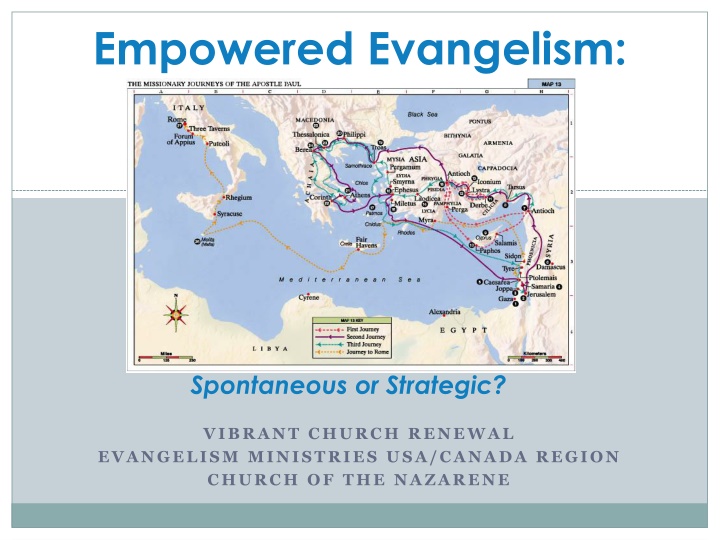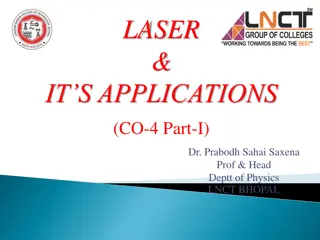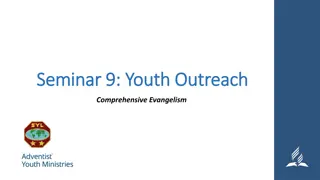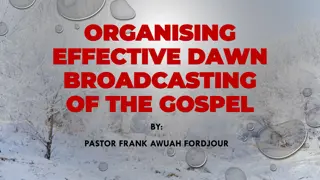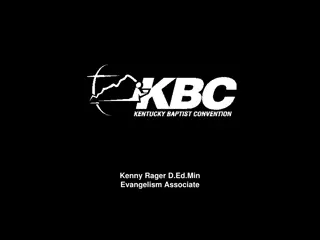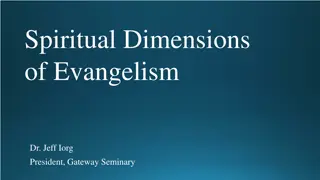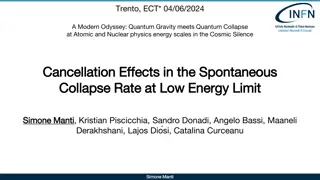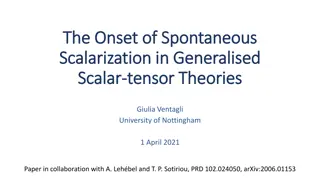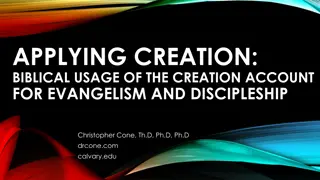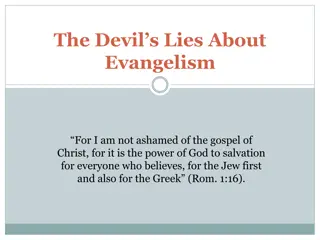Empowered Evangelism: Spontaneous or Strategic?
Explore the dynamic between spontaneous and strategic evangelism within the context of church renewal in the USA/Canada region of the Church of the Nazarene. Delve into how the early Church responded to persecution, scattering disciples and leading to the spread of the Gospel. Reflect on the significance of being empowered by the Holy Spirit for effective evangelism outreach.
Download Presentation

Please find below an Image/Link to download the presentation.
The content on the website is provided AS IS for your information and personal use only. It may not be sold, licensed, or shared on other websites without obtaining consent from the author.If you encounter any issues during the download, it is possible that the publisher has removed the file from their server.
You are allowed to download the files provided on this website for personal or commercial use, subject to the condition that they are used lawfully. All files are the property of their respective owners.
The content on the website is provided AS IS for your information and personal use only. It may not be sold, licensed, or shared on other websites without obtaining consent from the author.
E N D
Presentation Transcript
Empowered Evangelism: Spontaneous or Strategic? VIBRANT CHURCH RENEWAL EVANGELISM MINISTRIES USA/CANADA REGION CHURCH OF THE NAZARENE
Empowered Evangelism: Spontaneous or Strategic? The purpose of this module is to: To grasp how the Holy Spirit ministered through the church; To look for opportunities opened by the Spirit; To become useful to the Holy Spirit for evangelism.
Empowered Evangelism: Spontaneous or Strategic? Things to Keep in Mind... The disciples concern was kingdom restoration (Acts 1:6). 1. Evidently the disciples wanted to know more about God s timetable (Acts 1:7). 2. Jesus refused to give them all the information they wanted. 3. He made it clear He was leaving, the disciples were staying, and the Holy Spirit was coming. 4. He assured them they would be filled with His Spirit and they would become witnesses (Acts 1:8). 5.
Empowered Evangelism: Spontaneous or Strategic? Things to Keep in Mind... We can view Acts as outlined by Acts 1:8 and conclude the New Testament Church strategically planned to move from Jerusalem to Judea and then Samaria with the Gospel. 6. Some biblical interpreters see the Church selecting certain cities to evangelize. 7. Others point out the Church targeted centers of Roman administration, Greek civilization, Jewish influence and commercial importance, e.g. Philippi, Corinth, Cyprus and Ephesus. 8. The Church appears to focus on specific provinces in which to plant congregations (Acts 19:21). 9.
Empowered Evangelism: Spontaneous or Strategic? Persecution quickly impacted the fledgling Church. I. A. Persecution SCATTERED the disciples from Jerusalem (Acts 8:4). B. Philip going to Samaria to minister is an example of the dispersed disciples MOVING into new areas.
Empowered Evangelism: Spontaneous or Strategic? C. The Jerusalem church had shown no signs of becoming missionary. D. Persecution CAUSED the Church to take the Good News elsewhere. E. The human impulse to RUN to safety united with the divine impulse to witness
Empowered Evangelism: Spontaneous or Strategic? II. Planned or spontaneous evangelism? A. The work of the early church probably was more spontaneous than it was planned. B. Antioch was a city where the Jew/Gentile BARRIERS were slight. C. No official policy in the Jerusalem church INDICATES this city was to be evangelized.
Empowered Evangelism: Spontaneous or Strategic? D. Disciples who could not keep quiet about their faith ACTED spontaneously where doors were open and people were responsive. E. Berea was not as large as some other cities in Macedonia, but the Spirit seemingly LED Christians there.
Empowered Evangelism: Spontaneous or Strategic? III. Spirit-directed or humanly led? A. The role of key personnel 1. Paul seemed to TARGET leaders in the community for evangelization. 2. The proconsul of Cyprus, chief man in Malta, procurators, Felix and Festus, King Agrippa, Bernice and the Emperor serve as examples. 3. These individuals had no greater value, but they did have immense influence.
Empowered Evangelism: Spontaneous or Strategic? 4. On the other hand, the Spirit RECRUITED Philip to encounter the Ethiopian (Acts 8:26-40). 5. The Spirit PUSHED Peter to go to Cornelius (Acts 10). 6. The Church LISTENED to the Spirit who selected Barnabas and Saul to evangelize.
Empowered Evangelism: Spontaneous or Strategic? B. Natural channels 1. Paul chose to WORK along natural means of communication in the Roman Empire. 2. Every major area where Christians were effective in the first century, the Jews were there first. 3. When Paul went to Cyprus (Acts 13:5-8), he preached in synagogues.
Empowered Evangelism: Spontaneous or Strategic? 4. He PREACHED first to the Jews in their synagogues (Romans 1:16). 5. Going to the Jewish synagogues seemed to be a good beginning place for Gentile ministry as well, because God-seekers were found in the synagogues. 6. Paul s strategy began in the synagogues (Acts 17:2).
Empowered Evangelism: Spontaneous or Strategic? C. Indigenous churches. 1. The longest Paul stayed was two years. 2. He would find converts, ORGANIZE them, move on and send letters. 3. He would PIGGY-BACK on the work the Spirit who had preceded him.
Empowered Evangelism: Spontaneous or Strategic? IV. People of God as evangelists A. All Christians BECAME evangelists. 1. Roving ministers did not stay long in one place. 2. Congregations DEPENDED upon the spiritual gifts of its members to sustain vitality. 3. Christians were not ELECTED by a church, but felt called of God to evangelize.
Empowered Evangelism: Spontaneous or Strategic? B. Local pastors were ENGAGED in evangelism (II Tim. 4:5). 1. They built up Christians in such a way that each person discovered and EXERCISED their unique ministries. 2. In an address to Ephesian pastors, Paul sets his own evangelistic example before them (Acts 20:17-21).
Empowered Evangelism: Spontaneous or Strategic? C. Theologians and philosophers 1. Early schools were set up as evangelistic agencies. 2. The purpose of these schools was to BRING all kinds of people with various intellectual abilities to the truth about God as revealed in Christ Jesus.
Empowered Evangelism: Spontaneous or Strategic? D. Informal missionaries The great mission of Christianity was ACCOMPLISHED by informal missionaries. Christianity was primarily a LAY movement (Acts 8). Women, such as Dorcas, Lydia, Drusilla, the four prophesying daughters of Philip, upper-class women of Berea and Thessalonica, SHARED their faith. Eight of twenty-six greetings in the Book of Romans, are directed to women. 1. 2. 3. 4.
Empowered Evangelism: Spontaneous or Strategic? The character of Christians The quality of Paul s life CONVINCED the Thessalonians his message was the Word of God (I Thessalonians 2:1-14). Law abiding V. A. B. 1. Claudius Lysias WRITES to Governor Felix assuring the governor of Paul s innocence (Acts 23:26-30). 2. Many charges of wrongdoing were AIMED at Paul and the disciples (Acts 24:5-6). 3. Luke is intent upon showing impartial and competent judges CONFIRMING the innocence of Christians.
Empowered Evangelism: Spontaneous or Strategic? Humility When miracles took place, the early Christians wanted to point to the work of God (Acts 3:12-13). Miracles were to bring people to Christ and to bring glory to God. C. 1. 2. D. Sacrifice Paul and Barnabas were willing to RISK their lives (Acts 15:26). Their frequent persecutions BECAME their credentials. 1. 2.
Empowered Evangelism: Spontaneous or Strategic? E. Obedience to God Obeying God RECEIVED higher priority than obedience to humans (Acts 5:29). The Holy Spirit was GIVEN to those who obeyed (Acts 5:32). Even spiritual leaders inside of Judaism began to serve God (Acts 6:7). Paul AVOWED his obedience to the Lord (Acts 26:19). 1. 2. 3. 4.
Empowered Evangelism: Spontaneous or Strategic? 5. The disciples were RESPONSIVEto God s commands (Acts 5:20). 6. They eagerly FOLLOWED the impulse of the Great Commission (Acts 5:21). 7. They were subject to the Holy Spirit s direction (Acts 26:27). 8. Peter RESPONDSto the Spirit s direction (Acts 10:20-21).
Empowered Evangelism: Spontaneous or Strategic? F. Intensity 1. Paul GAVE himself completely to teaching the Word when he got help from Silas and Timothy (Acts 18:5). 2. Paul was able to TEACH full-time after he made tents (Acts 18:3). 3. Paul FOCUSEDon God s mission of testifying to the Gospel (Acts 20:24).
Empowered Evangelism: Spontaneous or Strategic? G. Joy 1. The disciples CONSIDERED it sheer joy when they were able to share the claims of the gospel. 2. Conversion and joy were closely related (Acts 8:8, 13:52, 15:3).
Empowered Evangelism: Spontaneous or Strategic? Small Group Discussion Read Acts 16:11-40. Discuss the following questions: 1. How do you see God at work in this story? 2. Describe the human dynamics in this account. 3. Evaluate the divine and human factors in starting a congregation in Philippi.
Empowered Evangelism: Spontaneous or Strategic? Action Planning 1. How can you personally and together as a congregation unite with the Spirit to reach people for Christ? 2. What characteristics of the New Testament Christians will you imitate? 3. To whom will you go in your community to share Good News? 4. What groups of people in your community are receptive to the Gospel? 5. Schedule prayer for improved evangelistic effectiveness.
